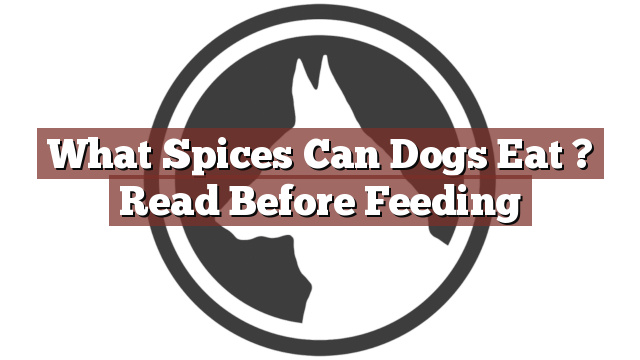Understanding Your Dog’s Dietary Needs
As responsible pet owners, it is important to understand the dietary needs of our furry friends. While dogs primarily thrive on a diet of meat, they can also benefit from certain spices added to their meals. However, it is crucial to note that not all spices are safe for our canine companions. Before incorporating spices into your dog’s diet, it is essential to be well-informed about which ones are suitable for them and in what quantities.
What Spices Can Dogs Eat? Read Before Feeding
Can dogs eat spices? Yes, some spices are safe and even beneficial for dogs when used in moderation. The key is to choose spices that are non-toxic and do not contain any harmful additives. Some spices that can be safely included in your dog’s diet are turmeric, ginger, cinnamon, and parsley. These spices not only enhance the flavor of your dog’s food but also provide various health benefits.
Turmeric is a popular spice known for its anti-inflammatory properties. It can help alleviate joint pain and reduce the risk of chronic diseases such as arthritis. Ginger is another spice that is safe for dogs and can aid in digestion, relieve nausea, and improve their overall digestive health. Cinnamon is not only a delightful addition to your dog’s meals but also has anti-inflammatory and antioxidant properties. Lastly, parsley can freshen your dog’s breath and aid in digestion.
Pros and Cons of Feeding Spices to Dogs
Feeding spices to dogs can have both advantages and disadvantages. On the positive side, spices can provide various health benefits. As mentioned earlier, spices like turmeric and ginger have anti-inflammatory properties and can improve your dog’s overall well-being. Additionally, certain spices can enhance the taste of your dog’s food, making it more enjoyable for them to eat.
However, it is important to exercise caution and use spices in moderation. Some spices, such as garlic and onion, can be toxic to dogs and should be avoided entirely. Excessive consumption of spices can also lead to digestive issues and upset stomachs in dogs. It is always recommended to consult with your veterinarian before introducing any new spices into your dog’s diet to ensure their safety and well-being.
Conclusion
While some spices can be safely incorporated into your dog’s diet, it is crucial to be aware of which ones are suitable for them. Spices like turmeric, ginger, cinnamon, and parsley can provide health benefits and enhance the taste of your dog’s meals. However, it is essential to avoid toxic spices such as garlic and onion. As responsible pet owners, consulting with your veterinarian is always recommended to ensure the safety and overall health of your furry companion. Remember, a well-balanced diet is key to keeping your dog healthy and happy.
Thank you for taking the time to read through our exploration of [page_title]. As every dog lover knows, our furry friends have unique dietary needs and responses, often varying from one canine to another. This is why it's paramount to approach any changes in their diet with caution and knowledge.
Before introducing any new treats or making alterations to your dog's diet based on our insights, it's crucial to consult with a veterinarian about [page_title]. Their expertise ensures that the choices you make are well-suited to your particular pet's health and well-being.
Even seemingly harmless foods can sometimes lead to allergic reactions or digestive issues, which is why monitoring your dog after introducing any new food item is essential.
The content provided here on [page_title] is crafted with care, thorough research, and a genuine love for dogs. Nevertheless, it serves as a general guideline and should not be considered a substitute for professional veterinary advice.
Always prioritize the expert insights of your veterinarian, and remember that the health and happiness of your furry companion come first.
May your journey with your pet continue to be filled with joy, love, and safe culinary adventures. Happy reading, and even happier snacking for your canine friend!

